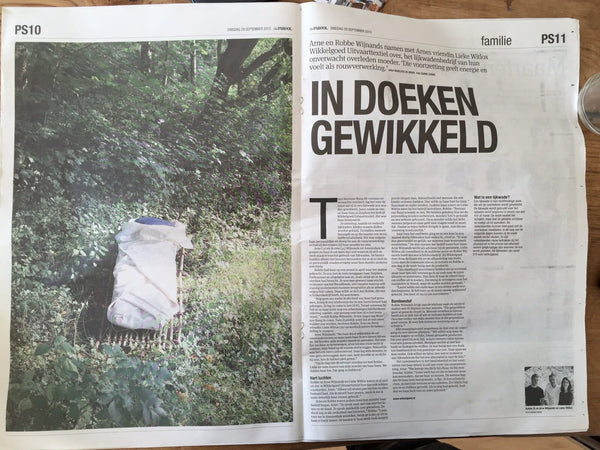Article in the Parool
Wrapped in a shroud
Arne and Robbe Wijnands, together with Arne's girlfriend Lieke, took over Witlox Wikkelgoed Uitvaarttextiel, the shroud company of their unexpectedly deceased mother. 'That continuation gives energy and feels like processing grief.'
Life's work
When Monique Rang died unexpectedly this spring, it was obvious that she would be wrapped in a shroud. For years, she ran the company Wikkelgoed from her home in Zutphen. It was her life's work. She designed, sewed and sold shrouds : cloths in which the dead are wrapped. In this way, she provided dozens of people with a beautiful, loving farewell. According to her, it was more personal and contributed to the grieving process; that was how she had experienced it with her mother and grandmother. After her death, Arne (31) and Robbe (34) Wijnands from Amsterdam understood more than ever why she had advocated the use of shrouds. The brothers could not have imagined that they would experience so quickly and so personally what their mother helped others with. Robbe had taken her to the station one evening in April. She was going back to Zutphen by train. She was enthusiastic and cheerful, as she always was when she had visited Amsterdam. She had been to a meeting of the Broodfonds , a safety net that self-employed people can fall back on if they become disabled. She wanted to join it with Robbe, who has a painting company. "Less than an hour after I had said goodbye to her, I received a phone call that she had suffered a cardiac arrest. She was in a coma in the OLVG. Completely unexpected. The fact that she arranged disability insurance at the age of 61 says enough about how she approached life," says Robbe Wijnands. Monique Rang was in a coma for seven days. When it became clear that she would not wake up, Robbe, Arne and his girlfriend Lieke Witlox (29) decided, on medical advice, to stop the treatment. Arne Wijnands: "After her death, we wrapped her in a linen shroud. We could touch my mother through it. It was nice to care for her like that, to straighten a fold every now and then, to put my hand on the warm fabric. Of course, it was also very confronting. There lay my mother; there was no escape. It was precisely because she was so close that I was able to come to terms with it." "On the day of the funeral, we stood around her with Robbe, Lieke and two of my mother's sisters. We covered her up. It was so loving."
Finding relief
Robbe and Arne Wijnands and Lieke Witlox quickly decided that they wanted to continue Wikkelgoed Uitvaarttextiel no matter what. Arne: "Only we knew exactly what her vision was. When I hear myself talk, I notice that I sometimes literally use her sentences." Arne and Robbe were teenagers when their mother started her company. Arne: "She often talked to us about life and death. She spoke easily about feelings. She saw death as part of life." Robbe: "Later, when we lived in Amsterdam, she sometimes called when she needed to get something off her chest. She often experienced poignant things in her work, for example with people who had lost a child. Then she wanted to get something off her chest." As they grew older, her sons and Lieke Witlox became more involved in the company. Robbe: "They called us the Board of Directors. We looked at how we could improve the pricing, took better photos and built a website. Our mother wanted to help people, and she found it difficult to ask for money for that. Because she was almost bankrupt, that innovation was necessary." Just when things were going much better, and she had sold thirty shrouds in one month, she died. "So there was no doubt; we had to continue her life's work." The three run the company in addition to their jobs. Arne Wijnands works as an advisor for the municipality, Lieke Witlox as a consultant in the public sector and Robbe Wijnands has a painting company. At Wikkelgoed, Arne does the finances and handling emails, Lieke does the communication and the website and Robbe works on production one day a week. "We have our standard range in stock, but for special requests, I look for the right colours and materials. Then I cycle to the Albert Cuyp to pick out fabrics. I then take them to the sewing studio in Noord, where the shrouds are made." "Recently, an old man wanted to be buried in a denim shroud. I bought some beautiful denim fabric at the market. That cloth is now in our range."
Bamboo fabric
Robbe Wijnands is often the first person to deal with customers and their wishes on the phone. "Those conversations quickly go into depth. For example, people tell you that they are ill or who they have lost and how. Because of the loss of my mother, I can have those conversations well. I know how intense and sad a farewell is." Every Monday evening, the three meet to discuss progress and new plans. "We want to put even more emphasis on honest, locally made products. That fits in well with this time, in which people are increasingly opting for a green funeral. Monique already worked with fair trade and organic fabrics. She was working on a cloth made of bamboo fabric and a prototype made of jute. We will continue with that. We also want to show what is so beautiful about shrouds and that it is an alternative to the coffin." Working together in the family business and continuing its mission is also a form of coping with grief. Arne: "It brings us closer together and to our mother. Robbe: "Sometimes it feels bad that she can no longer experience it, that we miss her so much. Knowing that this made her proud is nice. She could laugh out loud, so loud that people would be surprised. She would have felt that joy now. If she had been alive, we would have heard her laugh for sure."
What is a shroud?
A shroud is a rectangular cloth that is wrapped around the deceased. The shroud is used for a wake, and/or burial instead of a coffin. The shroud covers the body, but leaves the figure visible and invites touching. The relatives can easily wrap the deceased themselves. In the following days, they can gradually close the shroud. In this way, the relatives are closely involved in the farewell and the process of saying goodbye is more even than when the coffin is closed. The shrouds are available from 275 euros. Written for the Parool


